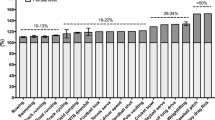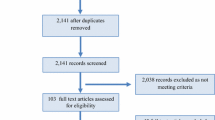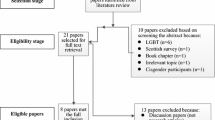Abstract
The reported application of rational emotive behavior therapy (REBT) with athletes is growing but remains scarce within sport psychology literature. This study used a single-case multiple-baseline across participants design to investigate the effects of REBT on irrational self-depreciation beliefs and unconditional self-acceptance (USA) with three male mixed martial arts (MMA) athletes. Visual and statistical analyses indicate a reduction in total irrationality and self-depreciation and an increase in USA, which was maintained at 6 months post-REBT for two of the three athletes. Social validation data revealed positive changes in emotion management and performance in all athletes. The mechanisms by which REBT promoted changes in self-depreciation and USA are discussed as are recommendations regarding the future implementation of REBT with athletes.


Similar content being viewed by others
References
Barker, J., McCarthy, P., Jones, M., & Moran, A. (2011). Single case research methods in sport and exercise. Oxford: Routledge.
Barker, J. B., Mellalieu, S. D., McCarthy, P. J., Jones, M. V., & Moran, A. (2013). A review of single-case research in sport psychology 1997–2012: Research trends and future directions. Journal of Applied Sport Psychology, 25(1), 4–32. doi:10.1080/10413200.2012.709579.
Bartels, J., & Herman, W. (2011, May 28th). Fear of failure, self-handicapping, and negative emotions in response to failure. Paper presented at Paper presented at the Annual Convention of the Association for Psychological Science, Washington, D. C.
Bergman, L. R., Magnusson, D., & El Khouri, B. M. (2003). Studying individual development in an interindividual context: A person-oriented approach. Mahwah, NJ: Lawrence Erlbaum.
Bernard, M. E. (1985). A rational-emotive mental training program for professional athletes. In A. Ellis & M. E. Bernard (Eds.), Clinical applications of rational-emotive therapy (pp. 227–309). New York: Plenum.
Bewick, B. M., Trusler, K., Mulhern, B., Barkham, M., & Hill, A. J. (2008). The feasibility and effectiveness of a web-based personalised feedback and social norms alcohol intervention in UK university students: A randomised control trial. Addictive Behaviors, 33, 1192–1198. doi:10.1016/j.addbeh.2008.05.002.
Browne, C. M., Dowd, E. T., & Freeman, A. (2010). Rational and irrational beliefs and psychopathology. In D. David, S. J. Lynn, & A. Ellis (Eds.), Rational and irrational beliefs in human functioning and disturbances: Implications for research, theory, and practice. New York: Oxford University Press.
Chamberlain, J. M., & Haaga, D. A. (2001). Unconditional self-acceptance and psychological health. Journal of Rational-Emotive and Cognitive-Behavior Therapy, 19(3), 163–176.
Cohen, J. (1992). A power primer. Psychological Bulletin, 112(1), 155. doi:10.1023/A:1011189416600.
Cotterill, S. T., & Symes, R. (2014). Integrating social media and new technologies into your practice as a sport psychology consultant. Sport and Exercise Psychology Review, 10(1), 55–64.
Cropley, B., Miles, A., Hanton, S., & Niven, A. (2007). Improving the delivery of applied sport psychology support through reflective practice. Sport Psychologist, 21(4), 475–494.
CV Productions (no date). ‘The History of MMA’ retrieved from http://cvproductionsinc.com/cv-productions/. Last accessed: 27/05/15
David, D., Lynn, S. J., & Ellis, A. (Eds.). (2010). Rational and irrational beliefs: Research, theory, and clinical practice. Oxford: Oxford University Press.
David, D., Schnur, J., & Belloiu, A. (2002). Another search for the “hot” cognition: Appraisal irrational beliefs, attribution, and their relation to emotion. Journal of Rational-Emotive and Cognitive-Behavior Therapy, 20, 93–131. doi:10.1023/A:1019876601693.
David, D., Szentagotai, A., Eva, K., & Macavei, B. (2005). A synopsis of rational-emotive behavior therapy (REBT); fundamental and applied research. Journal of Rational-Emotive and Cognitive-Behavior Therapy, 23(3), 175–221. doi:10.1007/s10942-005-0011-0.
Davies, M. F. (2008). Irrational beliefs and unconditional self-acceptance. II. Experimental evidence for a causal link between two key features of REBT. Journal of Rational-Emotive & Cognitive-Behavior Therapy, 26(2), 89–101. doi:10.1007/s10942-007-0060-7.
Downe-Wamboldt, B. (1992). Content analysis: method, applications, and issues. Health Care for Women International, 13(3), 313–321.
Driscoll, R. (1989). Self-condemnation: A comprehensive framework for assessment and treatment. Psychotherapy: Theory, Research, Practice, Training, 26(1), 104.
Dryden, W. (2009). How to think and intervene like an REBT therapist. London: Routledge.
Dryden, W., & Branch, R. (2008). Fundamentals of rational emotive behaviour therapy: A training handbook. Chichester: Wiley.
Dryden, W., & Neenan, M. (2004). The rational emotive behavioural approach to therapeutic change. London: Sage.
Dunn, J. G., Dunn, J. C., Gotwals, J. K., Vallance, J. K., Craft, J. M., & Syrotuik, D. G. (2006). Establishing construct validity evidence for the Sport Multidimensional Perfectionism Scale. Psychology of Sport and Exercise, 7(1), 57–79.
Elko, K. P., & Ostrow, A. C. (1991). Effects of a rational-emotive education program on heightened anxiety levels of female collegiate gymnasts. The Sport Psychologist, 5, 235–255.
Ellis, A. (1962). Reason and emotion in psychotherapy. New York: Stuart.
Ellis, A. (1977). Psychotherapy and the value of a human being. In A. Ellis & R. Greiger (Eds.), Handbook of rational emotive therapy. New York: Springer.
Ellis, A. (1984). The essence of RET. Journal of Rational-Emotive and Cognitive-Behavior Therapy, 2(1), 19–25.
Ellis, A. (1985). Intellectual fascism. Journal of Rational Emotive Therapy, 3(1), 3–12.
Ellis, A., David, D., & Lynn, S. J. (2010). Rational and irrational beliefs: A historical and conceptual perspective. In D. David, S. J. Lynn, & A. Ellis (Eds.), Rational and irrational beliefs in human functioning and disturbances. Oxford: Oxford University Press.
Ellis, A., & Dryden, W. (1997). The practice of rational-emotive behavior therapy. New York: Springer.
Falek, A., & Britton, S. (1974). Phases in coping: The hypothesis and its implications. Social Biology, 21, 1–7.
Grove, J. R., Norton, P. J., Van Raalte, J. L., & Brewer, B. W. (1999). Stages of changes as an outcome measure in the evaluation of mental skills training programs. The Sport Psychologist, 13(1), 107–116.
Harpold, M. E. (2008). The mental cage: A qualitative analysis of the mental game in the sport of mixed martial arts (Unpublished master’s thesis). Georgia Southern University, Statesboro, Georgia.
Hill, A. P., Hall, H. K., Appleton, P. R., & Kozub, S. A. (2008). Perfectionism and burnout in junior elite soccer players: The mediating influence of unconditional self-acceptance. Psychology of Sport and Exercise, 9(5), 630–644. doi:10.1016/j.psychsport.2007.09.004.
Jacobson, N. S., & Truax, P. (1991). Clinical significance: A statistical approach to defining meaningful change in psychotherapy research. Journal of Consulting and Clinical Psychology, 59(1), 12–19.
Kazdin, A. (1982). Single-case experimental designs. In P. C. Kendall & J. N. Butcher (Eds.), Handbook of research methods in clinical psychology (pp. 461–490). New York: Wiley.
Kazdin, A. E. (2011). Single-case research designs: Methods for clinical and applied settings. Oxford: Oxford University Press.
Larner, C. (2008). On making warriors out of worriers: The management of trait anxiety in competitive sports (Doctoral dissertation, Victoria University).
Lindner, H., Kirkby, R., Wertheim, E., & Birch, P. (1999). A brief assessment of irrational thinking: The shortened general attitude and belief scale. Cognitive Therapy and Research, 23, 651–663. doi:10.1023/A:1018741009293.
Lystad, R. P., Gregory, K., & Wilson, J. (2014). The epidemiology of injuries in mixed martial arts: A systematic review and meta-analysis. Orthopaedic Journal of Sports Medicine, 2(1), 1–10. doi:10.1177/2325967113518492.
MacInnes, D. (2003). Evaluating an assessment scale of irrational beliefs for people with mental health problems. Nurse researcher, 10(4), 53–67.
Marlow, C. (2009). Creating positive performance beliefs: The case of a tenpin bowler. In B. Hemmings & T. Holder (Eds.), Applied sport psychology: A case based approach (pp. 65–87). London: Wiley.
Massey, W. V., Meyer, B. B., & Naylor, A. H. (2013). Towards a grounded theory of self-regulation in mixed martial arts. Psychology of Sport and Exercise, 14(1), 12–20.
Mellalieu, S. D., Neil, R., Hanton, S., & Fletcher, D. (2009). Competition stress in sport performers: Stressors experienced in the competition environment. Journal of Sports Sciences, 27(7), 729–744. doi:10.1080/02640410902889834.
Midgley, C., Arunkumar, R., & Urdan, T. C. (1996). “If I don’t do well tomorrow, there’s a reason”: Predictors of adolescents’ use of academic self-handicapping strategies. Journal of Educational Psychology, 88(3), 423–434. doi:10.1037/0022-0663.88.3.423.
Mills, B. D. (1993). Rehabilitation counseling for athletes prior to retirement: A preventative approach using self-acceptance to enhance performance before and after retirement. [Opinion Piece] Retrieved from http://files.eric.ed.gov/fulltext/ED366571.pdf. Last accessed 10/3/15
Neff, K. (2003). Self-compassion: An alternative conceptualization of a healthy attitude toward oneself. Self and identity, 2(2), 85–101.
Ottenbacher, K. J. (1986). Reliability and accuracy of visually analyzing graphed data from single-subject designs. American Journal of Occupational Therapy, 40(7), 464–469.
Page, J., & Thelwell, R. (2013). The value of social validation in single-case methods in sport and exercise psychology. Journal of Applied Sport Psychology, 25(1), 61–71. doi:10.1080/10413200.2012.663859.
Parker, R. I., & Vannest, K. (2009). An improved effect size for single-case research: Nonoverlap of all pairs. Behavior Therapy, 40(4), 357–367.
Parsonson, B. S., & Baer, D. M. (1978). The analysis and presentation of graphic data. In T. R. Kratochwill (Ed.), Single-subject research: Strategies for evaluating change (pp. 105–165). New York: Academic Press.
Qualtrics: Output data for this paper was generated using Qualtrics software, Version 37892 of the Qualtrics Research Suite. Copyright © 2014 Qualtrics, Provo, UT, USA. http://www.qualtrics.com.
Rogers, C. (1959). A theory of therapy, personality and interpersonal relationships as developed in the client-centered framework. In S. Koch (Ed.), Psychology: A study of a science. Formulations of the person and the social context (Vol. 3). New York: McGraw Hill.
Scott, J. (2007). The effect of perfectionism and unconditional self-acceptance on depression. Journal of Rational-Emotive and Cognitive-Behavior Therapy, 25(1), 35–64.
Strean, W., & Roberts, G. (1992). Future directions in applied sport psychology research. The Sport Psychologist, 6, 55–65.
Szentagotai, A., & Jones, J. (2010). The behavioral consequences of irrational beliefs. In D. David, S. J. Lynn, & A. Ellis (Eds.), Rational and irrational beliefs in human functioning and disturbances. Oxford: Oxford University Press.
Terjesen, M. D., Salhany, J., & Sciutto, M. J. (2009). A psychometric review of measures of irrational beliefs: Implications for psychotherapy. Journal of Rational-Emotive and Cognitive-Behavior Therapy, 27(2), 83–96. doi:10.1007/s10942-009-0093-1.
Turner, M. J. (2014). Smarter thinking in sport. The Psychologist, 27(8), 596–599.
Turner, M. J., Allen, M., Slater, M. J., Barker, J. B., Woodcock, C., Harwood, C. G., & McFadyen, K. (2016). The development and initial validation of the irrational performance beliefs inventory (iPBI). European Journal of Psychological Assessment. doi:10.1027/1015-5759/a000314.
Turner, M., & Barker, J. B. (2013). Examining the efficacy of rational-emotive behavior therapy (REBT) on irrational beliefs and anxiety in elite youth cricketers. Journal of Applied Sport Psychology, 25(1), 131–147. doi:10.1080/10413200.2011.574311.
Turner, M. J., & Barker, J. B. (2014). Using rational emotive behavior therapy with athletes. Sport Psychologist, 28(1), 75–90.
Turner, M. J., Slater, M. J., & Barker, J. B. (2014). Not the end of the world: The effects of rational-emotive behavior therapy (REBT) on irrational beliefs in elite soccer academy athletes. Journal of Applied Sport Psychology, 26(2), 144–156. doi:10.1080/10413200.2013.812159.
Vaccaro, C. A., Schrock, D. P., & McCabe, J. M. (2011). Managing emotional manhood fighting and fostering fear in mixed martial arts. Social Psychology Quarterly, 74(4), 414–437.
Wampold, B. E., & Furlong, M. J. (1981). The heuristics of visual inference. Behavioral Assessment, 3(1), 79–92.
Acknowledgments
The authors would like to acknowledge Andrew Wood, Staffordshire University, for his work on the statistical analyses of data.
Author information
Authors and Affiliations
Corresponding author
Ethics declarations
Conflict of interest
The authors declare that they have no conflict of interest.
Rights and permissions
About this article
Cite this article
Cunningham, R., Turner, M.J. Using Rational Emotive Behavior Therapy (REBT) with Mixed Martial Arts (MMA) Athletes to Reduce Irrational Beliefs and Increase Unconditional Self-Acceptance. J Rat-Emo Cognitive-Behav Ther 34, 289–309 (2016). https://doi.org/10.1007/s10942-016-0240-4
Published:
Issue Date:
DOI: https://doi.org/10.1007/s10942-016-0240-4




